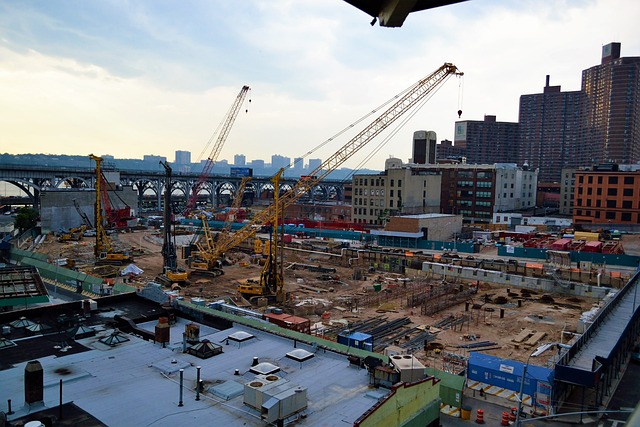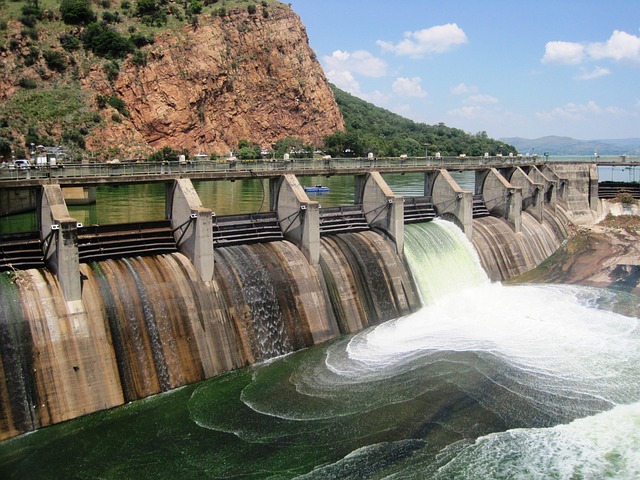Civil engineering is a versatile and broad industry that covers lots of different engineering areas with different objectives.
Civil engineering generally covers the design, plan, construction, and maintenance of man-made and natural structures built for human use or benefit. Civil engineers build infrastructures like roads, bridges, dams, stadiums, pipelines, and sewage systems.
They are involved at almost every stage of the project and work both on and off-site to make sure that the process runs smoothly and that the structure is of the best quality. Civil engineers also frequently take on project management roles, overseeing the planning, designing, analyzing, researching, budgeting, and construction processes.
On-site they’ll survey the landscape before construction, identifying important information about the land type, and nearby natural factors like bodies of water, protected land, or hills. Maps and designs will be drawn from this data and used to plan the layout of the structure.
In the office, they’ll analyze and research the landscape to identify the best materials, basic constructional elements, financial implications, and measures that should be taken to make sure that the project is causing as little environmental impact as possible, and hopefully even contributing to its natural surroundings.
Because civil engineering is such a broad industry, subdisciplines focusing on different areas and specialties have been created to allow engineers to find their niche and provide expert contributions to any project in question.
Civil engineers from different subdisciplines will frequently work together to make sure the structure is built with the best materials and functions in the way it should.
These subdisciplines can range anywhere from the more generalized construction and management engineering types, to more unique subdisciplines like coastal or earthquake engineering.
Here are some of the civil engineering subdisciplines that are available to pursue if you’re interested in joining the industry:
- Structural engineering
- Environmental engineering
- Geotechnical engineering
- Transportation engineering
- Water resource engineering
- Surveying
- Construction engineering
- Municipal engineering
- Coastal engineering
- Earthquake engineering
- Forensic engineering
- Materials science and engineering
- Site development and planning
There are a lot of options, but in this blog post, we’ll focus mostly on the first eight subdisciplines in the list above. In this article, we’ll teach you how extensive civil engineering is and, who knows? You might even learn about an engineering type that you haven’t come across before.
Structural Engineering
Structural engineering is the branch of engineering focused on the “bones and muscles” of a building’s structure. They are creative and highly skilled engineers who focus on the stability of buildings and infrastructure. Structural engineers make sure that the building can endure harsh weather conditions and is strong enough to fit its purpose.
For example, when building structures like hospitals, structural engineers will need to make sure that the building can support heavy loads, so they have to factor in the number of people that will be using the building regularly and the heavy equipment that will be used on each floor.
Structural engineers are crucial during the design and planning processes, providing the foundational information for other engineers to build on. They create drawings, complete calculations, and review the work of other engineers. They have to write up reports and evaluate and critique the methods used on construction sites.
Structural engineers are also safety experts, designing buildings that can stand heavy loads and harsh weather conditions and will make sure that the building or structure is safe to use. For example, in areas prone to tectonic movement, structural engineers will work alongside earthquake engineers to prevent collapsing during earthquakes.
Structural engineers will build on data received by surveyors to decide how structures should be built on particular land types and surfaces, to make sure it’s built for maximum strength and durability.
They frequently work alongside architects, construction workers, and other civil engineers in different branches. Their contribution to construction and design is vital for almost all civil engineering projects, so structural engineers will be needed for most projects.
Structural engineers usually work on projects like these:
- Large buildings
- Bridges
- City infrastructures
- Rollercoasters
- Space platforms

via Pixabay
Environmental Engineering
Environmental engineering is one of the most important branches of engineering out there. In fact, when civil engineers are completing their undergraduate degree programs, many institutions label their programs as civil and environmental engineering programs, which shows how significant the environmental influences are in the general civil engineering industry.
As its name suggests, the role of an environmental engineer is to protect human and animal life from environmental deterioration and to make sure the construction of buildings and infrastructure is causing as little environmental damage as possible.
Environmental engineers are also charged with overseeing man-made systems like pipelines and sewage systems and can even contribute to the improvement of recycling processes.
They’ll also consider how pollution levels can be better controlled and will often work with water resource engineers to combat water pollution. To minimize damage to human and animal health, environmental engineers will monitor pollution levels and track pollutants in areas of high pollution to prevent environmental decay.
Environmental engineers will frequently apply chemical, biological, physical science, and geographical principles to design and build structures or systems that will benefit the environment and prevent ecological problems.
Environmental engineers will need strong knowledge in these areas and should have the determination to combat the current environmental crisis. These engineers are vital for the survival of natural ecosystems and wildlife and can help the human population work towards a greener future.
Environmental engineers often provide the information needed for landscape preparation. If a proposed project is on a wetland, for example, these engineers will complete wetland delineations or flood maps and let other engineers know about what type of wetland is on the property and whether any legal processes have to be followed before construction can begin.
Environmental engineers will likely work on projects like these:
- Waste disposal systems
- Greener buildings
- Any structure built on an environmentally vulnerable landscape
- Pollution projects
Geotechnical Engineering
Geotechnical engineering is all about the construction of infrastructure in and around high levels of soil and rock.
Geotechnical engineers should have a Bachelor’s Degree in Civil Engineering, but should also have a strong knowledge of geology and an interest in working with and preserving geological elements.
Geotechnical engineers have to have expert-level knowledge of soil types and rock types. Before construction planning begins, these engineers will investigate the land in the area being considered and decide what materials and construction methods will help to preserve the surrounding rock and soil.
Not only will geotechnical engineers evaluate how to protect the surrounding environment, but they’ll also consider how the structure can be most effective and functional in that specific landscape.
If, for example, construction is supposed to take place in an area with high levels of weak rock or contaminated soil, the geotechnical engineer will have to figure out how the structure will be impacted and determine whether it will be a safe area to build.
Geotechnical engineers usually work on projects like these:
- Roads
- Bridges
- Slopes
- Tunnels
- Any structure surrounded by or causing disruption to geological elements
Transportation Engineering
Transportation engineering is the field of engineering targeting the construction of infrastructure used for transportation. Transportation systems are important to modern human life and are used daily by millions of people.
Not only do transportation-related structures have to endure harsh weather conditions like every other structure, but their constant use causes a more intense type of wear and tear.
Transportation engineers are tasked with making sure that railways, roads, and airports are equipped to withhold consistent and heavy use. Large vehicles use our highways every day and heavy trains fill the railways, so these structures have to be strong, stable, and durable.
Maintenance is also a vital part of a transportation engineer’s role. It’s especially crucial that transportation systems are safe and running smoothly because if something were to break or wear down, it could cause major disruption or even injury or death.
Making sure that these systems are functioning correctly will not only prevent damage to vehicles, trains, and planes but can also prevent the need to pay for expensive repairs later on.
Transportation engineers can be found working on projects like these:
- Roads
- Railways
- Structures built in airports
Water Resource Engineering
Water resource engineering, also referred to as hydraulic engineering, has to do with the design and planning of water structures. This can be any equipment or system that helps to keep our water resources running smoothly.
Water resources engineers plan, build, and maintain vital water systems that we use every day. They can prevent the deterioration of these systems so there’s no major disruption to our lives.
Water resource engineers build irrigation systems that are used by gardeners or farmers to ensure water dispersion and crop growth. They also build structures around rivers, lakes, and coastlines, and prevent geographical decay like erosion or flooding.
They also plan and build water pipelines that are used by households all over the world. Water resources engineers are extremely valuable to the daily lives of people worldwide.
The preservation of natural surroundings is a priority for water resource engineers, and their goal is to make natural water systems more efficient and help us use our water in the most eco-friendly ways we can.
Water resource engineers frequently work with environmental engineers, coastal engineers, and even earthquake engineers to help stop climate change and address any rises in sea levels, but they also make sure that infrastructure and structures in vulnerable areas are stable enough to deal with hurricanes, tsunamis, and flooding.
Water resource engineers usually work on projects like these:
- Sewage systems
- Dams
- Irrigation systems
- Pipelines
- Waterways

via Pixabay
Surveying
Surveying is a critical part of engineering, although sometimes it’s forgotten. Surveying is usually the first step in any construction project, providing the initial information needed by other engineers to guarantee the safety of the structure and the preservation of the surrounding environment.
To work as a surveyor, you’ll need to take specific classes outside of what is normally offered in an engineering degree. You’ll also have to pursue licensure and meet distinct guidelines set by the state you plan to work in.
Surveyors will often use drones, digital twin technologies, or LiDAR devices to help create high-quality maps and collect data about the landscape that will be used for construction.
Data about the land type or any nearby natural components like rivers, lakes, or mountains that could cause issues during the construction process is collected and passed on to other engineers for consideration.
Construction Engineering
Construction engineering is the management and completion of any construction project, whether that be industrial, residential, or commercial.
Construction engineers plan the construction process, oversee construction workers throughout the process, and will also inspect completed projects.
Construction engineers will frequently work alongside architects, structural engineers, and other engineering technicians to manage and complete structure designs and follow up on the cost of each project.
Projects like bridges, skyscrapers, residential housing, or large buildings will all be planned by a team of construction engineers.
While these roles sound similar to a general civil engineer, construction engineers are more concerned with the construction process itself and oversee the development of the project and manage everything on-site.
Construction engineers work on projects like these:
- Overseeing construction work
- Planning construction processes
- Making sure industrial, residential, and commercial projects are carried out correctly and adhere to all applicable regulations
Municipal Engineering
Municipal or urban engineering has to do with the management, design, and construction of smaller structures in cities or towns. Projects with larger buildings usually fall to structural, construction, or general civil engineers, and municipal engineers manage parks, pavements, waterways, or sewage systems in cities.
Municipal engineers will frequently work with water resource engineers but will need a strong grasp of physics and water principles, as well as specialized knowledge of plumbing and pipelines.
Municipal engineers usually work on projects like these:
- Parks
- Waterworks
- Pavements
- Sewage systems
Final Thoughts
Civil engineering is a broad term for lots of different types of engineering, each dealing with different specialties and project types.
Choosing civil engineering as a career path gives you a lot of room to grow and change, allowing you to specialize at any time in any of the specialties we’ve mentioned.
Civil engineers of all types are vital to the general function of our society and can have a real impact on the way we live our lives. Their environmental priorities can help lead us to a more sustainable future and can improve the efficiency of both natural and human systems.
For more information on civil engineering and its subdisciplines, head over to the Fenstermaker engineering service page.





